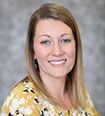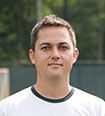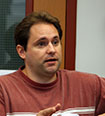Among his initial college experiences, Jeff Beck, director of the Lilly Library, remembers one vividly.
A little before 7 p.m. on a rainy night, he’s strolling across campus at the University of Missouri hearing the bells chime from the student union, thinking about the opening lines of George Orwell’s novel, “1984.”
Fitting that “1984” would be on his mind since it was the fall of 1984 and that Beck was heading to a seminar class to discuss the Orwellian classic. As a first-generation college student, he was armed with the simple confidence of a high school graduate and interest in the book itself, but there was a lot he didn’t know.
“Here we go,” he told himself. “This is the start.”
He did not know the class was taught by two English-born professors. He did not know that he would be seated in a class with junior and seniors, even graduate students.
“Here I am a little freshman and I have a seat in this class exposed to a whole range of ideas,” said Beck. “I had no idea that every stage of college education could b e represented in one class. Looking back, it was awfully special to be in that class.”
e represented in one class. Looking back, it was awfully special to be in that class.”
Hindsight can illuminate plenty of I-had-no-idea moments for many students, first-generation or otherwise, but the realization of having to develop a new set of competencies when you step on campus can be daunting.
“I remember having significant anxiety about meeting with faculty, or even participating in class discussions, out of concern for how I would be perceived,” said Associate Professor of Psychology Neil Schmitzer-Torbert of his initial college experiences. “I didn’t want to ask a question that might bring negative attention, or acknowledge confusion or difficulty working with a text or a problem.”
Today is the First-Generation College Celebration, a national day of recognition to highlight the success of first-generation college students, faculty, and staff. Here at Wabash, there are 48 members of the faculty and support staff who are first-gen college graduates.
Associate Professor of Biology Patrick Burton remembers the idea behind college being a simple one.
“I thought of it as more school, and I liked school,” he said, “which is a very good thing because I’ve either been in school or worked at a school since I was five years old. I don’t think I had any idea of what college was other than a school that I lived at.”
Fitting in at college, both socially and academically, can take time and may not happen simultaneously.
“There were adjustments of trying to figure out my place,” he said. “Socially it was challenging. You are stuck in a small room or suite with people you’ve never met and are supposed to end up being friends. I’m not naturally outgoing, so it took some time for me to warm up.”
Associate Director of Career Services Cassie Hagan felt similar issues at Ball State. While she was able to make some good friends early on, getting settled in her chosen major wasn’t easy.
“Honestly, I didn’t really fit in with the personalities of the other people in my major in the beginning,” she said. “I learned to appreciate them because we were in the same classes. At the end of my college experience though, I really appreciated getting to know them on a more personal level. There was a real diversity of interest and personality.”
One of the biggest hurdles for many college students, especially first-generation students, is a financial one.
For head soccer coach Chris Keller, that meant two years of community college immediately after high school.
 “I knew college could be an option for me, but I knew I had to take different avenues to make it work financially,” he said. “After those first two years, I was unsure if I was going to be able to finish because of money. I was fortunate to get a soccer scholarship (at the University of the Southwest). Without that, I thought I might be done with school.”
“I knew college could be an option for me, but I knew I had to take different avenues to make it work financially,” he said. “After those first two years, I was unsure if I was going to be able to finish because of money. I was fortunate to get a soccer scholarship (at the University of the Southwest). Without that, I thought I might be done with school.”
Being a first-gen, low-income student was not so much of a limiting factor in whether Schmitzer-Torbert could afford to stay at Knox College, but in what he could participate. Cost was always an issue.
“I remember being interested in a study abroad program and was very anxious to figure out the price tag,” he explained. “The idea of coming up with a few thousand dollars out of pocket or more in loans ended the discussion. I try hard to remind myself now that each person I encounter is struggling with his or her own set of circumstances.”
Finances aside, there are inevitable struggles about what to expect from college beyond the classroom: what’s it like living in a dorm, studying all night for an exam, or, perhaps, what’s a tailgate? That’s the first-gen difference.
Often the difficulty is finding someone to talk to who has been there.
“There wasn’t anyone in my family who I could ask about struggles in college or how to deal with life as a college student,” Burton said, a graduate of Williams College. “I felt like I couldn’t call my parents and ask, ‘what should I do?’”
That experience has made Burton keenly aware that students who haven’t learned from their parents what college is like are less likely to know how to succeed in college at first. He’s worked within the biology department and through the college as a whole to modify courses in ways that might provide a fairer assessment of student learning regardless of background.
“Sometimes, it comes up in conversation,” said Burton. “I try to relate to students, ‘hey, I’m also first-gen.’ I know what that is like.”
A key part of the learning experience for Burton happened almost by accident. He told a story about the first test he took in a second semester biology course where a professor took 10 points off for a question that Burton felt he had answered fully. After crossing campus and returning to his dorm, he decided to email the professor and state his objections. The professor replied within minutes and invited Burton to his office to talk.
The resulting conversation didn’t get Burton a higher test score, but he did get something more meaningful. “It was the first time I was convinced that the faculty really did care about me,” he said. “Partly by dumb luck, I figured out how to interact with them. Maybe, if I wasn’t first-gen, someone would have told me that sooner.”
“There are a lot of guys who can accomplish a great deal, they just haven’t been given the ladders,” said Beck. “They have to work each rung to appreciate that they are entering into an intellectual conversation. It’s showing interest in the person and recognizing that everyone has a spark.”